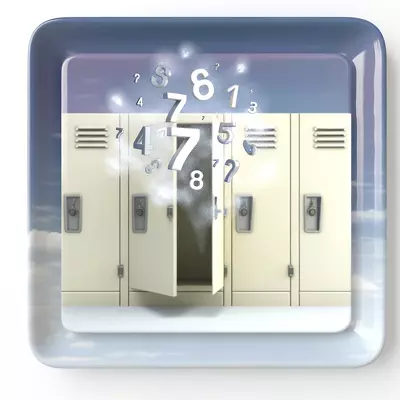Understanding Your Dream About Forgetting Locker Combination: A Deep Dive

Dreams often serve as a window into our subconscious, revealing deeper fears, anxieties, and unresolved issues. A common theme that surfaces in the realm of dreams is the feeling of being unprepared or unable to recall crucial information when it matters most. This sensation, epitomized by the struggle to remember a locker combination, symbolizes a broader fear of failure or inadequacy in facing life’s challenges and responsibilities.
I. Introduction
A. Understanding Dreams
Dreams are a universal human experience, rich in symbolism and meaning. They are the mind’s way of processing emotions, experiences, and thoughts that occupy our waking lives. This nocturnal narrative often draws from the well of the subconscious, presenting scenarios that range from the mundane to the utterly surreal. Analyzing dreams can offer insights into our desires, fears, and unresolved questions, providing a unique perspective on our inner selves.
B. The Symbolism of Forgetting
Forgetting in dreams, especially something as specific as a locker combination, is laden with symbolism. This motif frequently represents feelings of being lost, unprepared, or overwhelmed by life’s demands. It mirrors the fear of not meeting expectations or losing access to something important, whether it be opportunities, relationships, or knowledge. The act of forgetting thus becomes a metaphor for a broader sense of insecurity or inadequacy.
C. The Locker Combination in Dreams
Dreaming about forgetting a locker combination specifically taps into the anxiety of being barred from accessing something valuable or essential. Lockers, as personal spaces containing private or important items, symbolize aspects of our identity or parts of our lives we deem significant. Thus, the inability to remember the combination reflects fears of losing control over crucial elements of our lives or forgetting important aspects of our identity.
II. Psychological Interpretation
A. Fear of Failure and Inadequacy
This theme in dreams points to an underlying fear of failure and feelings of inadequacy. The stress of not recalling a locker combination can be interpreted as a fear of not living up to one’s own or others’ expectations. It embodies the anxiety of failing to achieve goals, perform adequately in various roles, or maintain control over personal and professional lives.
B. Anxiety and Stress Manifestation
Dreams about forgetting often surface during periods of high stress or anxiety, serving as a manifestation of these emotional states. They reflect the dreamer’s internal struggles with anxiety, showcasing how stress from the waking world seeps into the subconscious. Such dreams can act as indicators, urging the dreamer to address and manage their stressors more effectively.
C. Transition and Change
Forgetting a locker combination also symbolizes transition and change. Lockers are associated with periods of growth, such as school or new job environments, where one must adapt and learn new routines. Forgetting the combination in a dream could indicate apprehension or resistance toward upcoming changes or transitions in the dreamer’s life, highlighting their fear of the unknown or uncharted territories.
III. Cultural and Social Dimensions
A. Collective Unconscious and Archetypes
The dream motif of forgetting a locker combination taps into the collective unconscious and archetypes described by Carl Jung. It represents a universal experience shared across cultures, embodying common fears and anxieties about personal growth, transition, and the responsibilities that come with it. The locker and its combination serve as symbols of the personal trials and tribulations everyone faces in their journey through life.
B. Societal Pressures and Expectations
Such dreams can also reflect societal pressures and the weight of expectations placed on individuals. The fear of forgetting signifies the dread of not conforming to societal standards or fulfilling roles prescribed by cultural norms. It underscores the struggle many face in balancing personal desires with external demands, often feeling inadequate or unprepared in the process.
C. The Locker as a Symbol of Personal Space and Privacy
In dreams, the locker stands as a symbol of personal space, privacy, and the aspects of our lives that we keep guarded. Forgetting its combination suggests a vulnerability or exposure, fearing that one’s private thoughts, feelings, or experiences could be laid bare or that one could be denied access to one’s sanctuaries and secrets.
IV. Practical Implications
A. Impact on Daily Life
Dreams about forgetting important information, like a locker combination, can have tangible effects on daily life, influencing mood, self-esteem, and anxiety levels. They may cause individuals to question their memory and cognitive abilities, potentially leading to increased stress and worry in everyday situations where performance and recall are key.
B. Strategies for Coping with Anxiety
Addressing the underlying anxiety that fuels these dreams is crucial. Strategies may include mindfulness meditation, cognitive-behavioral techniques, and stress management practices. Engaging in regular physical activity, maintaining a healthy sleep schedule, and seeking professional counseling can also aid in mitigating the impact of stress and anxiety on both waking and dreaming states.
C. The Role of Memory in Dreams
The act of forgetting within a dream, particularly something as symbolic as a locker combination, highlights the complex role of memory in our dreams. It suggests that while some memories can be vividly recalled or reimagined in dreams, others, especially those associated with anxiety or fear, can be elusive or distorted. This interplay between memory and dream content can offer insights into the dreamer’s emotional and psychological states.
V. Common Themes and Variations
A. School and Academic Performance
Dreams about forgetting locker combinations are often set in school environments, reflecting concerns about academic performance and the pressure to succeed. They symbolize the challenges of meeting academic expectations and the fear of needing to prepare for tests, presentations, or critical evaluations.
B. Work and Professional Challenges
In the context of work, such dreams can symbolize fears related to professional competence, job security, and career advancement. Forgetting a locker combination in this setting reflects anxieties about meeting job responsibilities, maintaining professional relationships, and achieving career goals.
C. Personal Relationships and Social Dynamics
These dreams can also pertain to personal relationships and social interactions, where the locker represents private or sensitive aspects of one’s life. Forgetting the combination might indicate fears of vulnerability, trust issues, or concerns about losing connection with significant others.
VI. FAQs
Q: What does forgetting a locker combination in a dream symbolize?
A: It often symbolizes anxiety, fear of failure, or feeling overwhelmed by life’s challenges and responsibilities.
Q: How can understanding dreams about forgetting help us in real life?
A: By reflecting on the emotions and contexts of these dreams, we can identify and address underlying anxieties and stressors in our waking lives.
Q: Are dreams about forgetting common?
A: Yes, dreams about forgetting important information or tasks are common and reflect universal fears and anxieties.
Q: Can such dreams be linked to real-life memory issues?
A: While these dreams can sometimes reflect concerns about memory or cognitive abilities, they are more often symbolic of deeper emotional or psychological issues.
Q: What strategies can help cope with the anxiety highlighted by these dreams?
A: Mindfulness, stress management practices, and professional counseling can be effective in dealing with the anxiety these dreams may signify.
Q: Is it normal to experience recurring dreams about forgetting something important?
A: Recurring dreams, including those about forgetting, indicate unresolved stress or anxiety in one’s life and are prompt to address these issues.
Q: Why do we forget dreams so quickly?
A: Dreams are often forgotten quickly due to the state of our brain upon waking. During REM sleep, when most dreaming occurs, the brain is not in its optimal state for storing memories, leading to rapid forgetting of dream content.
Q: Why am I angry in my dreams?
A: Anger in dreams can reflect unresolved feelings, stress, or frustration in your waking life. It might indicate a need to address these emotions or conflicts more directly.
VII. Conclusion
A. Summarizing Key Insights
Dreams about forgetting, such as the inability to recall a locker combination, serve as a mirror reflecting our innermost fears, anxieties, and the pressures of daily life. They are symbolic of broader themes of insecurity, transition, and personal growth challenges.
B. The Significance of Dream Interpretation
Interpreting these dreams provides valuable insights into our subconscious, offering a unique lens through which to view our emotional and psychological landscapes. Understanding the symbolism and themes in our dreams can lead to greater self-awareness and emotional well-being.
C. Moving Forward: Applying Understanding in Daily Life
Acknowledging and reflecting on the themes of these dreams can empower us to address the underlying issues they represent. By confronting these fears and anxieties, we can find strategies to manage stress, navigate transitions more effectively, and enhance our overall quality of life.
VIII. Suggested Readings
Dreams serve as a profound source of insight and understanding into our subconscious minds. For those interested in exploring the world of dreams further, the following books offer valuable perspectives and analyses:
- “The Interpretation of Dreams” by Sigmund Freud: This seminal work by Freud lays the foundation for the study of dream interpretation and psychoanalysis, exploring the hidden meanings and mechanisms behind dreaming.
- “Man and His Symbols” by Carl Jung: Jung’s exploration of symbols and their significance in dreams and myths offers a deep dive into the collective unconscious and the personal significance of dream imagery.
- “The Dreaming Brain” by J. Allan Hobson: A neuroscientific approach to understanding how and why we dream, this book delves into the mechanisms of the sleeping brain and the interpretation of dreams.
- “Dreams: Hidden Meanings and Secrets” by David C. Lohff: This guide offers practical advice for interpreting dreams, providing insights into the common themes and symbols that appear in our nocturnal thoughts.
- “Why We Sleep: Unlocking the Power of Sleep and Dreams” by Matthew Walker: Walker’s book not only explores the critical importance of sleep for our health but also delves into the fascinating world of dreams and their impact on our well-being.
These readings provide a spectrum of perspectives, from psychoanalytical to neuroscientific, on the nature and significance of dreams. They offer both the curious and the serious student of dreams a wealth of knowledge and insight into one of our most intriguing and revealing mental processes.






